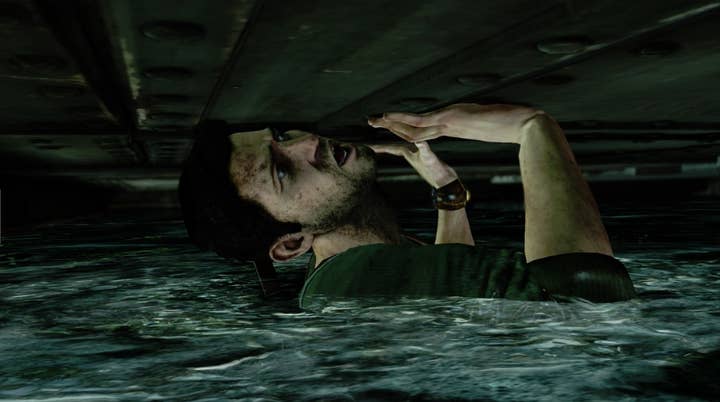Hennig: "Things are clearly not working the way they used to"
Uncharted creative director says mass layoffs a red flag that AAA development must change, shift to outsourcing "feels inevitable"
Amy Hennig has been in the industry a while now, long enough to earn a Lifetime Achievement Award. Over the course of her career, nearly everything about the job has changed.
But speaking with GamesIndustry.biz before accepting that honor at last month's DICE Summit in Las Vegas, Hennig says there is at least one constant in game development, namely human nature. In her estimation, the big challenge any team faces will stem from "human beings being human beings."
"What doesn't change is the challenge of trying to do a creative endeavor with a group of human beings, and that only gets more complicated as the teams have gotten bigger and bigger," she says. "In my career, I've gone from a two-person team to 15 or something, then 30, then 70, and up to now. It's just insane, right? So we all have all the same flaws we have as human beings, and then it's amplified by having a 300-person team versus a 10-person team."
Having left her days at Naughty Dog and Electronic Arts behind, Hennig isn't working on a 300-person team these days. In fact, she may never return to that scale of game development again.

"I personally needed a break from it, but in that break, it's been an opportunity to say I'm not even sure it makes sense to do it that way," Hennig says. "I think we keep doing it that way because we have these established companies and teams, and that's a resource, an asset you don't want to just throw away. But on the other hand, we're seeing news stories left and right where developers are folding and publishers are laying off hundreds of people. It feels like something feels inevitable, because the cost of development and keeping all these people on staff, especially in expensive areas, just doesn't feel sustainable."
"There are all these red flags, canary-in-the-mine moments where things are clearly not working the way they used to"
The topic is especially relevant as we speak, with much of the event buzzing about the previous day's news that Activision Blizzard would be laying off 800 people despite posting record financial results.
"I feel like there are all these red flags, canary-in-the-mine moments where things are clearly not working the way they used to, or not working," Hennig says.
As for what might work, Hennig looks to the TV and film industries as a model that makes some sense, as it relies less on in-house production and more on heavy use of external contractors.
"Obviously that would require a big sea change in the industry -- probably towards unionization, too -- but you would have a lot more external partners or freelance developers as part of a team, do more things as distributed development rather than have everything in-house," Hennig says. "It would allow for a lot more flexibility rather than feeling that constant pressure, that churn of salaries.
"And I think it would allow us a little more downtime, too. A lot of what we talk about with crunch pressure is not just the ambition of the titles, it's also just the fact that these people are employees. So we said, 'Thank God' when DLC became a thing, because there might be this huge dip of downtime where you might need 10 people but you have 300, so what are you going to do? They're employees. Now we can shuffle those people onto DLC content, but even then that creates this crunch churn on the staff."
While not having large internal teams might help solve quality-of-life issues, Hennig notes that it raises other questions that still need answers.
"It used to be that we were all jacks of all trades, almost. You kind of had to be"
"If we're in a studio system but we're all free agents, what would that look like? This is all speculative, because we're still living in a world where big companies have these giant staffs," Hennig says. "But even so, we never really used to do external development. Everything we did was more-or-less in-house. And more and more -- particularly for art, visual effects, and things like that -- we are working with external vendors a lot. It wouldn't be possible to make these big, impressive games if we weren't.
"So it feels like there's already a move in that direction. Whether it just becomes that we still have big teams and more external partners or smaller teams and more things are externalized remains to be seen."
It's possible the scale of the modern games industry will push people toward unions in other ways as well. Layoffs have been a fact of game developer life for decades, but they haven't always been covered as extensively as they are these days. Hennig says she left EA the first time in 1995 because it shut down the studio she was working at. She estimates it was less than 40 people at the time. These days a major studio closure for a AAA publisher typically makes for a more dramatic (and headline-worthy) number of lost jobs.
"One of the things that's changed is specialization," Hennig says. "It used to be that we were all jacks of all trades, almost. You kind of had to be because your team was so small that if you couldn't do art and design and layout and animation, title screen art or whatever needed to get done, there was nobody to hand it off to. It was easier back then, too. If you were an artist, you did everything. You did the characters, the animation, the background, whatever. Then slowly you start seeing specialization creep, and now you've got character artists who do nothing but skin textures, shaders or something like that. And somebody else does the actual model, somebody else rigs it, somebody else animates.
"That alone creates a certain amount of bloat in your staff because you have so many specialists now instead of generalists. And those are the kinds of skills that would normally be outsourced because they're so specialized. You don't need that person working full-time, every day, all year long."
Hennig suspects game development may go the way of the visual effects industry in film, where work can often be outsourced on the cheap.
"That's a shame, because I don't want to see people lose their jobs," Hennig says. "Even saying my desire is to work at a smaller studio, it's not because I want to see the industry shrink and get outsourced; it just feels inevitable. And it feels more financially sound to partner up."

